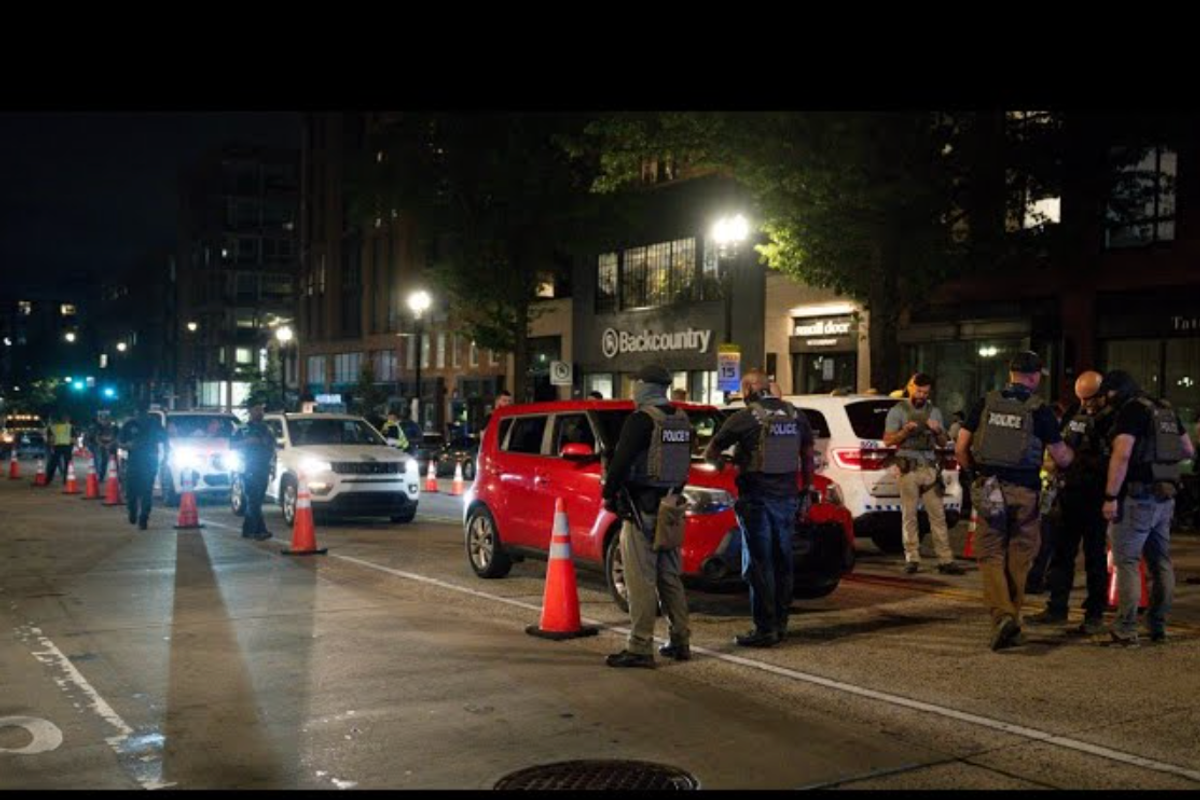
Protest at National Guard checkpoint on street in Washington, D.C.
Last week we learned that Trump and Pam Bondi twice overstepped in their claims of legal authority to militarize American cities. In Washington, D.C., the administration agreed to rewrite Bondi’s order after Judge Ana Reyes signaled it likely violated the Home Rule Act. And in San Francisco, Judge Chuck Breyer seemed poised to rule that the administration violated the Posse Comitatus Act by calling out troops absent a genuine rebellion.
It’s critical to call out both legal abuses. Reyes and Breyer join the valorous district court judges who have held the line against Trump’s serial overreaches.
But the real danger lies not in the courts but in the streets, where federal agents pressed into unlawful service have been violating the Constitution and acting like an occupying force. And they are spurred on from the top, with Trump telling the country that “they are allowed to do whatever the hell they want.”
The clearest example came at a makeshift roadblock in a nightlife district on an otherwise unremarkable weeknight. Just days earlier Trump had federalized Washington’s police force with a false, dystopian story of a “capital overtaken by violent gangs and bloodthirsty criminals.”
A joint unit of MPD officers and federal agents set up a checkpoint in one of the city’s busiest corridors. Drivers were waved to the curb, interrogated, and ticketed if their papers weren’t in order. Nearly 350 cars passed; 28 were stopped; 38 citations were issued; one driver was arrested.
Protesters quickly converged, surrounding the officers until the roadblock was disbanded. The scene looked less like community policing and more like a war novel on foreign occupation.
The checkpoint was not an isolated misjudgment but part of the new order: federal appointees urged to throw their weight around, accountable only to the White House, not to the city they claim to protect.
And it was unconstitutional. Officers must have at least some reasonable suspicion to stop citizens. The Supreme Court has allowed narrowly tailored checkpoints for drunk driving (Michigan v. Sitz) and immigration at the border (Martinez-Fuerte). But it made clear in the 2000 ruling, City of Indianapolis v. Edmond, that checkpoints for general crime control violate the Fourth Amendment. The D.C. Circuit struck down a similar program in Mills v. District of Columbia. Trump’s 2025 checkpoint fits squarely within Mills: routine crime control or immigration enforcement with no special justification. For D.C. residents, it must have felt as if they were suddenly living in an occupied zone.
In California, the federal deployment has allegedly produced systemic racial profiling. Civil rights groups have sued, charging that Black and Latino residents were stopped en masse, ordered to show ID, and searched without valid grounds. Multiple U.S. citizens were swept up in the dragnet.
The forces also exceeded the brief stop-and-questioning permitted under Terry v. Ohio. Law enforcement used rubber bullets, tear gas, and batons, and initiated full-scale arrests. None of the heavy-handedness seemed justified to keep order; plaintiffs alleged it was rather to stage a violent spectacle justifying further militarization.
At trial, Major General Scott Sherman — who commanded the National Guard in LA — admitted troops were deployed despite assessments finding minimal risk to federal personnel or property. Yet they participated in raids, set up roadblocks, and even rehearsed a “show of force” operation.
The aim was not to protect LA and return it to normal life, but to instill fear and tighten control — transforming the city into an occupied zone. And Trump has vowed to replicate the model in other blue cities, starting with D.C. and aiming next for Chicago, which he calls a “disaster.” Notably absent from his list are red-state communities with the nation’s highest violent crime rates.
Together, the D.C. and California cases underscore what we’re beginning to live through: Trump is not merely testing executive authority — he is establishing a police state. Illustrating the point, none other than Deputy Chief of Staff Stephen Miller showed up at the D.C. Police Department on Friday and crowed about the operation on Fox News over the weekend.
Once Trump asserts emergency power and dispatches troops, abuses follow quickly on the ground. That’s no accident: this is the president who once told officers, “Please don’t be too nice. When you put somebody in the car, rough them up a little bit.”
Emergency powers are supposed to be temporary and limited, restoring order at the request of overwhelmed officials. Instead, federalization under Trump imposes a chain of command indifferent to constitutional limits and accountable only to him. The macro-level claim of unchecked power yields micro-level violations: the unlawful stop, the discriminatory frisk, the intimidation of citizens who have done nothing wrong.
The D.C. checkpoint and the Los Angeles profiling are not one-offs but case studies in the danger of centralized control in the hands of a would-be authoritarian. Federalization, Trump style, delivers an occupying force looking to bust heads — answerable only upward, incentivized to produce visible “results,” and encouraged to do “whatever the hell they want.”
Washington and Los Angeles show what federalized law enforcement under Trump means in practice: arbitrary stops, racial targeting, citizens treated as subjects, the permanent creepiness of an occupied community.
The question we face daily is what citizens can do to push back. Often the answer can be puzzling, but here the answer is straightforward: show up. Show up in numbers that demonstrate widespread opposition to the invasion by federal agents.
We are not yet at the point where peaceful dissent — the peaceful part is crucial — can be punished. Imagine the impact if, wherever these patrols appear, they are met by larger numbers of citizens making unmistakably clear they are not needed and not wanted.
Show up. Stand together. And drive home the message with numbers and tenacity: Trump’s emergency is not our emergency.
Harry Litman is a former United States Attorney and the executive producer and host of the Talking Feds podcast. He has taught law at UCLA, Berkeley, and Georgetown and served as a deputy assistant attorney general in the Clinton Administration. Please consider subscribing to Talking Feds on Substack.
Reprinted with permission from Substack.
- Witness Says Trump Watched DC Riots On TV, Ignored Pleas To Intervene ›
- Humiliated Trump Seeks To Deflect Attention With Los Angeles Provocation ›
- With Urban Crime In Decline, Trump Wants Army To Occupy Major Cities ›








